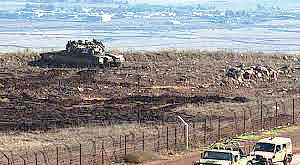

Additional seven soldiers injured; Israel tells UN it will defend itself against Hezbollah
i24news—Two Israeli soldiers were killed and an additional seven wounded Wednesday when an anti-tank missile fired from Lebanon hit one or two vehicles in a convoy in which they were traveling, the Israel Defense Forces said.
Semel Dor Nini, 20, and Yochai Kalangal, 25, perished in the attack, and IDF spokesperson confirmed.
A Spanish UN peacekeeper in south Lebanon was killed in an exchange of fire that ensued between Israel and Hezbollah. UNIFIL (the UN peacekeeping forces in South Lebanon) is reportedly conducting ceasefire negotiations between Israel and Hezbollah.
Israel responded with artillery fire and then with aerial strikes on a Hezbollah target in south Lebanon. One of the vehicles caught fire. Six soldiers were evacuated to hospital, several in moderate condition and the rest lightly injured.
At the same time, mortar shells fired from Lebanon hit Israeli positions on the Mount Dov area along the northern border. No injuries were reported but visitors were evacuated from the nearby Hermon ski sites.
Hezbollah claimed responsibility for the combined attacks, saying it had fired anti-tank missiles at a nine-car convoy. The organization said it was carried out by the “Queneitra Martyrs Brigade,” a clear indication that the attack was retaliation for last week’s killing near the Syrian town of Quneitra of six Hezbollah militants and six Iranians, including a Revolutionary Guard general, widely attributed to Israel.
Israeli artillery fired more than 20 shells toward the estimated source of the attacks in southern Lebanon.
“They’re trying to challenge us,” Prime Minister Benjamin Netanyahu said in a quick initial response. “They should see the heavy blow we dealt Hamas in Gaza last summer. We are prepared to react with force on all fronts.”
Residents were warned to stay indoors and shut doors and windows but shortly afterward the alert was lifted.
IDF Chief of Staff Benny Gantz convened an emergency meeting of his top staff to assess the situation.
Israeli bulldozers began drilling
Earlier in the day, Israeli bulldozers began drilling underground, looking for possible tunnels dug by Hezbollah from Lebanon.
The combined attack occurred a few hours after Israel’s air force targeted Syrian military positions in the town of Quneitra overnight Tuesday in retaliation for a missile attack on Israel earlier in the day. Arab media reported that the strike targeted Division 90 of the military militias loyal to Assad and allied with the Lebanese Hezbollah organization.
Shortly after the Israeli strike, warning sirens sounded on the Israeli side of the Golan Heights, in what appears to have been a false alarm.
At noon Tuesday, two missiles fired from Syria landed in open areas on the Golan, causing the evacuation of the Mount Hermon ski site but no injuries or damage. Israel reacted with a barrage of 20 artillery shells, and unconfirmed reports said four Syrians were killed or injured.
The decision to launch an air strike after the artillery attack was meant to signal to Syria and its allies that “we will not stand for any firing at Israel and a violation of our sovereignty, and we will react with force and decisiveness,” said Israeli Defense Minister Moshe Yaalon.
“The IDF holds the Syrian regime responsible for what occurs in its territory, and will work at any time and in any way it sees fit to protect the citizens of Israel,” the military said in a statement.
A senior Israeli defense official pointed the finger at Hezbollah as being responsible for the rocket fire, saying “Hezbollah is responsible for the incident in which rockets were launched into Israeli territory.”
Israel scrambled fighter aircraft into the air after the rockets landed and forces fired 20 artillery shells, reportedly hitting a Syrian artillery position. The Israel Defense Forces (IDF) said it identified direct hits on the target.
The IDF confirmed that four rockets had been fired from Syria and two had landed in uninhabited Israeli territory.
IDF spokesman Peter Lerner said the attack was deliberate and not the result of a spillover of fighting between rival factions in Syria.
Golan Regional Council head Eli Malka said he was “not surprised” by the attack and that the army had prepared for such a scenario.
Soon after the warning sirens sounded and residents rushed to shelters, nearly 1,000 visitors to the Hermon ski site near the Syrian border were evacuated on buses. The site has been packed with visitors in recent days following a heavy snowfall.
All the roads leading to the area were closed off as soldiers and police searched for the rocket landing sites. Residents were subsequently allowed to leave their shelters but were advised to stay close to protected areas.
Northern Israel has been on high alert since last week for possible Hezbollah retaliation following an attack on a Hezbollah convoy near the Israeli Golan Heights border, in which Iranian Revolutionary Guard General Mohammed Allah Dadi and Jihad Moughniyeh, Hezbollah commander and the son of the group’s late military leader Imad Moughniyeh, were killed along with six other Iranian soldiers and six Hezbollah operatives.
Military convoys leading tanks and armored personnel carriers last week arrived in the Golan Heights and the upper Galilee. Farmers from nearby towns were told to stay away from their fields near the border. The army also deployed a number of Iron Dome air defense batteries to the North.
Visit: http://www.i24news.tv/en/













